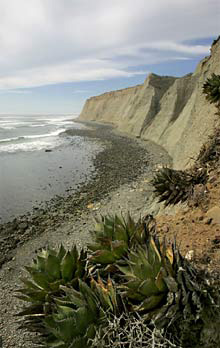
|  |  |  Business News | January 2009 Business News | January 2009  
Punta Colonet Port Project Put on Hold
 Frontera NorteSur Frontera NorteSur
go to original


| | Punta Colonet could to be transformed over the next decade into a megaport that will help to handle the increasing amount of cargo coming from eastern Asia. (Charlie Neuman/Union-Tribune |  |
Like Punta Colonet, the Manzanillo expansion to the south has also drawn fire from environmentalists.

A massive port planned for Mexico's Baja California peninsula could be among the latest casualties of the world financial crisis. Luis Tellez, Mexico's head of the Secretariat of Communications and Transportation (SCT), announced last week that authorities decided to postpone contract bidding for the construction of the Punta Colonet terminal slated for a remote section of the Baja California peninsula about 150 miles south of San Diego, California. Tellez said the global economic outlook didn't favor Punta Colonet at the moment.

"There is clearly competition for extensive resources," Tellez said, "and given the magnitude of Colonet we are seeing if there is the capacity to finance it."

The postponement was the second time in recent months that the SCT has put off issuing contracts to build and maintain a commercial trade and shipping complex that is envisioned to be larger than the ports of Los Angeles and Long Beach combined. Originally slated for completion on the Pacific side of Baja California in 2020, Punta Colonet was planned as the northern Mexican shipping hub of the China trade capable of handling 6 million containers every year.

Tellez did give an exact date for the opening of bids, but he insisted the project would move forward at a later date. Mexican officials, Tellez added, were working with Citibank and a second US bank to study financing options for a construction project that could cost more than $1.5 billion.

But earlier developments like the announced expansion of the Panama Canal is leading to speculation that Punta Colonet is dead even before it hits the water. Fernando Ramos Casas, president of the Latin American Confederation of Customs Brokers judged Punta Colonet as an unviable proposition under present circumstances. "(Punta Colonet) would have been better three or four years ago, Ramos said.

An unscientific, online poll conducted by the Tijuana news daily Frontera reported January 19 that 60.5 percent of 967 respondents believed a port at Punta Colonet would happen, while 39.5 percent did not think it would see the light of day.

It's not yet clear how the Punta Colonet postponement will affect the Santa Teresa train and transportation terminal planned for the New Mexico-Chihuahua border. Last year, the SCT declared that Santa Teresa would constitute an important hub for cargo headed to consumers in the US heartland from Punta Colonet.

Not everyone is disappointed that Punta Colonet is off the map – at least for now. Green activists have long criticized a mega-project they contend would attract thousands of new residents and generate an intense demand for services in a place Mexican environmentalist and columnist Ivan Restrepo once called a "national treasure" and a "flower of the earth." Restrepo and other environmentalists fear a mammoth port at Punta Colonet would seriously disrupt migratory bird habitats, disturb grey whale migrations and damage vegetation and landscapes unique to the fragile Baja California ecosystem.

"This is very good news for those who care about conservation in Baja California," said a message posted on the website of the binational green group Wild Coast in response to Tellez's announcement.

Despite a predicted 20-30 percent drop in the volume of cargo traffic through Mexican ports this year, the SCT is moving ahead with contract bidding for improvements and expansions in other ports that could reach close to US$2 billion. Nationwide, investment in Mexico's port infrastructure increased 15.8 percent during the first two years of the administration of Mexican President Felipe Calderon.

Meanwhile, with the fate of Punta Colonet up in the air, SCT Secretary Tellez's role in pushing the ongoing expansion of the large port of Manzanillo on the Pacific Coast is receiving renewed press scrutiny. The Mexican cabinet minister served as an advisor to the private SSA Mexico cargo company, one of the firms interested in expanding Manzanillo, from 2002-2006, just prior to joining the Calderon administration.

Tellez, who resigned from SSA Mexico before beginning federal service, has defended himself from conflict-of-interest charges. "The participation of SSA in the bidding does not depend on the SCT," Tellez was previously quoted as saying. "The authorization depends on the Federal Competition Commission."

Like Punta Colonet, the Manzanillo expansion to the south has drawn fire from environmentalists. Construction activities in Manzanillo have caused major damages to a 260-acre mangrove swamp, prompting some environmentalists to charge that Mexico is in violation of the 1971 International Convention on Wetlands and the Inter-American Convention on the Protection and Conservation of Sea Turtles, an agreement Mexico formally accepted in 2000.

Environmentalists are likewise concerned that two bills currently in the Mexican Senate and Chamber of Deputies would make the destruction witnessed at the Manzanillo mangrove swamp, which Secretary Tellez pledges to repair, the norm rather than the exception.

Sponsored by representatives of the Institutional Revolutionary Party, the legislative initiatives propose weakening environmental impact study requirements meant to protect mangroves if social and economic benefits from a particular development could be demonstrated.

Besides serving as bird habitat and breeding grounds for aquatic life, mangroves are important barriers against hurricanes, which many climate change researchers warn could grow worsen in coming years.

Additional sources: Frontera, January 19, 2009. Proceso, January 18, 2009. Article by Jenaro Vilamil. Milenio, January 16, 2009. Articles by Marisela Lopez and Luis Carriles. Agencia Reforma, January 14, 2009. Articles by Lilian Cruz. La Jornada, March 4 and 31, 2008; January 19, 2009. Articles by the Economist Intelligence Unit, Ivan Restrepo and editorial staff. Wildcoast.net

Frontera NorteSur (FNS)
Center for Latin American and Border Studies
New Mexico State University
Las Cruces, New Mexico |

 |
|  |



